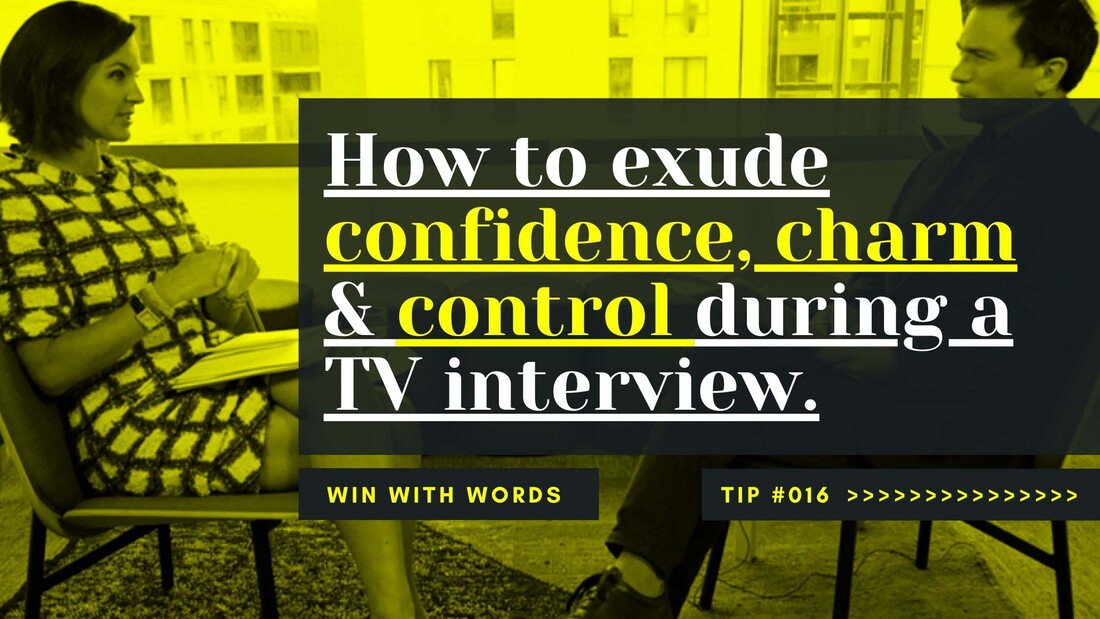|
Which of these behaviours would you expect someone described as 'in control' to display? Would you expect that person to be... Quiet or loud? Smiley or stoic? Proud or humble? Attentive or distant? Cordial or confrontational? Of all the public figures we've studied over the years, Alex Mahon, CEO of Channel 4, is in a league of her own. During interviews, when challenged, her composure is first class. Let's focus on Alex' 2022 appearance on BBC's The Media Show. The 25-minute conversation — discussing the then proposed privatisation of Channel 4 -- is a masterclass in confidence, charm and control. The way she displayed these traits, however, might surprise you. Below, using clips from that interview, we'll show you 5 interviewee skills Alex has in spades — skills that'll help you exude confidence, charm and control during your next (or first ever) media interview. SKILL 1: She keeps things brief When under mild pressure from a difficult question, people often clumsily stagger through their answers. More common still, is the tendency to over-answer the question. Alex is an expert practitioner in brevity — keeping her answers short and sweet. She makes her point then stops talking. Here's one example. Being succinct takes enormous discipline, but the rewards are two-fold. Firstly, it signals confidence because the less words you're using, the less chance 'umm...' will be one of them; and there's nothing less confidence-inspiring than 'umms...'. In business negotiations, for example, it is widely recognised that to "say it, then SHUT UP" is highly conducive to achieving a favourable outcome. Secondly, short answers keep the interview moving forward; creating welcome space for a more palatable question to be asked. SKILL 2: She keeps her cool Equanimity is a person's ability to maintain calm and composed when in difficult situations. In the next clip, Alex' equanimity shines twice, but interestingly, in two very different ways. Firstly, when the interviewer (Ros Atkins) challenges her on Channel 4's tendency to broadcast old re-runs, Alex gives context to his argument quickly, humorously and without bluster; taking the sting out of the mocking claim. Secondly, at 0:49, Ros tries to interrupt Alex mid-flow. What Alex does here is one of the most difficult interview skills to master — she simply continues her point without any escalation in volume or pitch. It's almost as though the interruption never happened. This is a top tier skill, and one that runs counter to all human instinct. What do I mean by 'it runs counter to all human instinct'? Well, the next time someone tries to interrupt you during a robust discussion, monitor your reflex. Did you raise your voice? You probably did. The irony is that by dropping your voice, your adversary is more likely to stop talking and listen to your point. Why? Pattern interrupt. Us humans are so accustomed to voices escalating during debate, that when voices drop, the brain is disorientated by the unusual behaviour, so 'shuts down' speech to give itself an opportunity to process the oddity. Did you see Ros shut down in the above clip? Bravo, Alex. SKILL 3: She slows down When we train our clients for media interviews, we give high priority to moderating their pace of speech. Simply put, by slowing down your speech, you display confidence. In fact, according to experts, those who slow their speech, choose their words carefully and don't over-talk are seen as more credible, more influential and more confident. Additionally, speaking slowly gives you essential thinking time, meaning you're less likely to make errors that compromise your integrity. Watch how she begins her answer below — it's subtle, but significant. As she rifled through her memory for the correct date, she could've showered us with a bunch of 'umms', but instead, she dropped the pace to near slow-motion. The irony of speaking slowly, is that no one ever notices it, but we tend to have an unfavourable perception of people who rush their words. SKILL 4: She knows her place You know we love a provocative headline. So, what do we mean by this? Well, it's common for interviewers to try to draw their guests into mind-reading, guesswork or conjecture. We advise our clients against playing that game; there's noting to gain from speaking on the behalf of another party, especially when that party's objectives oppose yours. The key here is to avoid phrases like 'I can't answer that' or 'I don't know'. Why/? Because those responses can appear defensive, evasive or plain ignorant. Instead, we recommend being resolute in your own position... and, if you're feeling assertive, invite the interviewer to ask the other party themselves. Observe... SKILL 5: She displays a breadth of personality Despite Alex' unflappable confidence, humour features in all her interviews — which not only brings an endearing humanity to proceedings, but serves to once again thaw those frosty incoming questions. Conclusion: As we showed you in this examination of Jeff Bezos and this dissection of Taylor Swift, what influential figures say in media interviews is often delivered with meticulous forethought, but as illustrated above, the most seasoned performers give equal consideration to how they say it. Although we recommend you assign equal vigour to honing the 'what' and the 'how', we believe the 'how' is the factor that most influences public perception. If that wasn't the case, the age old "he just doesn't come across very well" wouldn't carry such weight every four years at the ballot box. To boost your media presence and better engage audiences, call us on 0114 491 0636 or email us on hello@iconsmachines.com — we're the most meticulous PR specialists you'll talk to today. Alternatively, click here for FREE access to our other brilliant writing & communications articles.
0 Comments
Leave a Reply. |
Categories
All
Archives
October 2023
|


 RSS Feed
RSS Feed